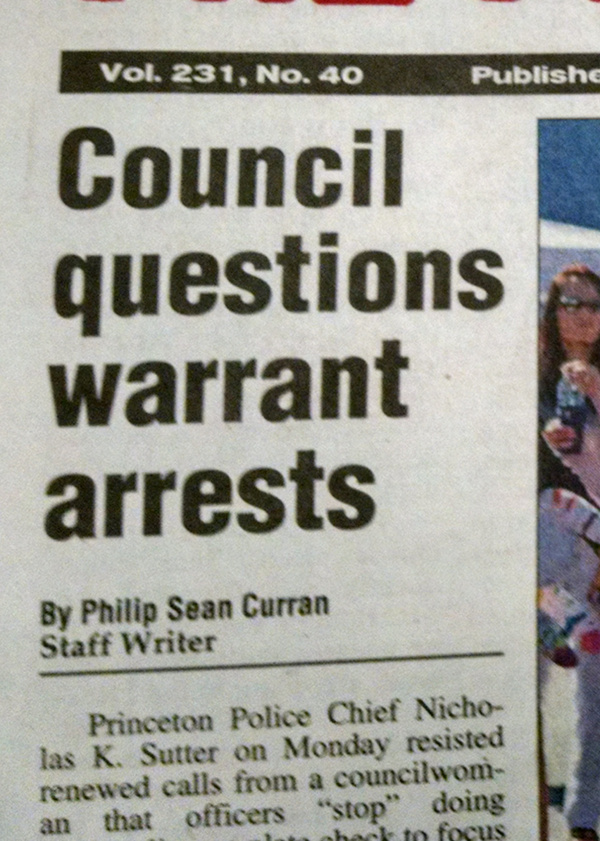First Amendment in peril in Princeton?
« previous post | next post »
 Yesterday, Roger Lustig sent in a snapshot of the front page of the Princeton Packet, with the observation that
Yesterday, Roger Lustig sent in a snapshot of the front page of the Princeton Packet, with the observation that
Maybe free speech, even the political kind, is in greater danger than we thought!
The online version of the headline is much longer, and not ambiguous in the same way: Philip Sean Curran, "PRINCETON: Police chief resists renewed calls to stop random license plate checks, focus more on speeding", The Princeton Packet 9/28/2016.
Ben Zimmer said,
October 1, 2016 @ 10:12 am
It's the N-V-N-N vs. N-N-V-N ambiguity, found in such classic crash blossoms as "Gator Attacks Puzzle Experts." In this case, N-V-N-N is the correct reading, while in the "Gator" example it's N-N-V-N.
Mara K said,
October 1, 2016 @ 10:33 am
I default to N-V-N-N, so this didn't puzzle me at all, but the alligator one did (no pun intended). I wonder what percentage of readers default to one type of reading vs the other.
Ben Zimmer said,
October 1, 2016 @ 11:28 am
Based on what I've seen, most of the crash blossoms with this type of ambiguity are like the "Gator" one: N-N-V-N misread as N-V-N-N. Other examples (from this post) include "Greece Fears Batter Markets Again" and "Carter Plans Swell Deficit." (That second one is actually misread as N-V-Adj-N, but close enough.) I think it's natural when seeing a singular noun followed by a word ending with "-s" to assume that the word is a verb agreeing with the noun. Then you have to go back and reinterpret the first two words as a N-N compound when you encounter the actual verb. N-N compounds likely occur in headlinese much more frequently than in other contexts, so they may mess with our default assumptions.
On the other hand, if you've become attuned to N-N compounds in headlinese, that might make you more likely to fall prey to the reverse ambiguity, N-V-N-N misread as N-N-V-N, as above. Misreadings of this sort might also be encouraged by unusual Vs that are easily mistaken for Ns (like "fans" in "Research Fans Hope for Spinal Injuries").
bratschegirl said,
October 1, 2016 @ 11:44 am
Even reading it as N-V-N-N makes me wonder what the poor warrants did to deserve being arrested.
Ralph Hickok said,
October 1, 2016 @ 2:50 pm
I agree with Mara K. I had no problem with this headline, but the "Gator Attacks" example made me laugh. If it's a classic, I'm surprised I've never seen it before.
fev said,
October 1, 2016 @ 6:22 pm
From the story, it sounds like a "warrant arrest" might be regional jargon for the expected outcome of what the cops call "running random plates." I don't recall "warrant arrest" from any of my shops (nor is it on their websites, though a quick nonrandom search finds it in New England, Oklahoma and California), so I'd add this to the slideshow with "Player helps blind woman."
Evidently the need to distinguish those arrests from others is a big enough deal in Princeton that nobody's very surprised by the term. I'm sure some subjects also exit their vehicles and flee on foot in an unknown direction.
David Morris said,
October 2, 2016 @ 1:57 am
I had the same problem with 'NP – warrant arrests', but took that as the meaning anyway. Even with Ben's explanation, it took me some time to see the N-N-V-N reading.
A few months ago on English Language Learners Stack Exchange, a learner asked how native English speakers understand headlines like this. I said, as an ESL teacher and not as a linguist, that I suspect native speakers look for, find and understand S-V-x as soon as they can.
Xtifr said,
October 2, 2016 @ 3:10 am
I read it correctly the first time, but the phrase "warrant arrests" seemed odd enough that I quickly reanalyzed it anyway. And then found myself with two plausible meanings, and no way of choosing between them except to read the story.
I would suggest that it is simply not very mellifluous, but it did make me want to read the story, if only to figure out what the headline is saying, and since the goal of a headline is to make someone want to read the story, I guess you could say it was successful.
Oh my god. Garden-path-as-clickbait! This opens up whole new worlds! (Of terror.) :D
Chas Belov said,
October 2, 2016 @ 3:27 am
I too read the Council Questions Warrant Arrests correctly and had trouble reading it wrong, although I eventually did. I'm assuming "warrant arrests" are arrests for outstanding warrants for arrest.
And I read the gator headline wrong the first time, but I suspect the lead-in primed me to read the Research Fans one wrong the first time.
DWalker07 said,
October 3, 2016 @ 1:33 pm
@Fev: "running random plates"? Someone catch them!
Nathan Rasmussen said,
October 6, 2016 @ 10:16 am
Two specimens in one week: the Toronto Star just gave us "Meteor shower sparks confused fears of plane crash."
You know, if I woke up one morning and found I had been transformed into a gigantic fear of plane crash, I'd be confused too, even without any meteor shower sparks.
BZ said,
October 6, 2016 @ 2:44 pm
While sparks as a verb is pretty standard headlinese, I'm still puzzling out confused fears after reading the article.
Andreas Johansson said,
October 11, 2016 @ 11:41 am
@ Xtifr:
I've seen enough ambiguous or just plain unclear headlines that I suspect they do it on purpose. If I'm in a bad mood, I'll make a point of not reading the article, on the logic of "if it's not important enough to express clearly, it isn't worth my time to read".